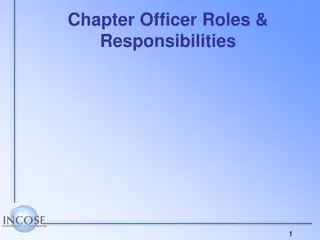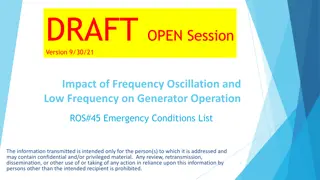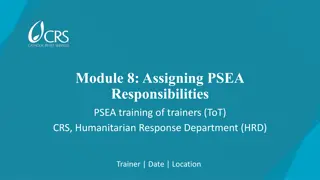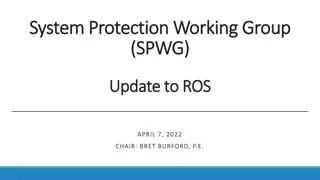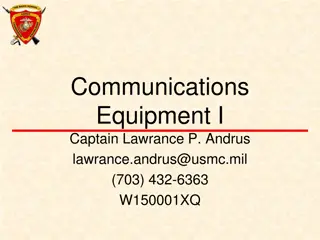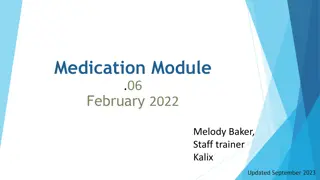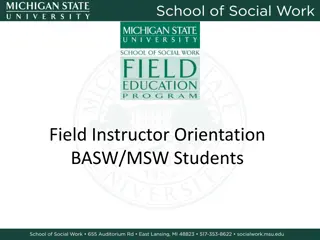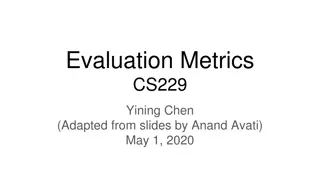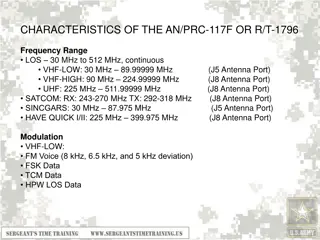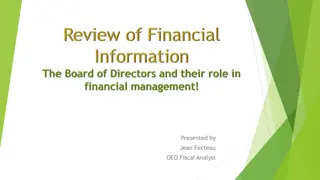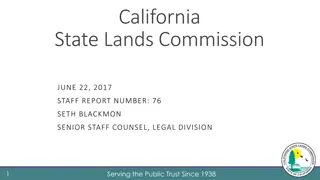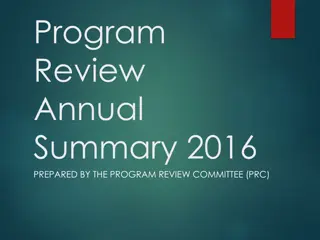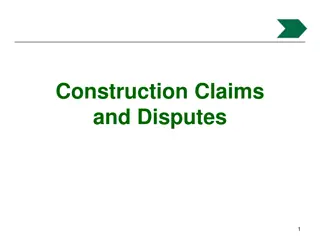Overview of PRC Responsibilities
This overview covers the composition and responsibilities of the Program Review Committee (PRC), including membership requirements, election processes, and roles of the PRC Chair. It also touches upon the Library Promotion Committee (LPC) composition and the duties of the PRC Chair within academic institutions.
- PRC Responsibilities
- Program Review Committee
- LPC Composition
- Faculty Evaluation
- Academic Institutions
Download Presentation

Please find below an Image/Link to download the presentation.
The content on the website is provided AS IS for your information and personal use only. It may not be sold, licensed, or shared on other websites without obtaining consent from the author. Download presentation by click this link. If you encounter any issues during the download, it is possible that the publisher has removed the file from their server.
E N D
Presentation Transcript
Overview of PRC Responsibilities Original content: CTLD 2020 Original content: CTLD 2020 Updates: Kerri Updates: Kerri Sowers Spring 2024 Sowers Spring 2024
Todays Session 1. Important Resources 2. PRC & LPC Composition 3. PRC Procedures 4. PRC Expectations 5. PRC Feedback & Decisions 6. Faculty Plan 7. File Evaluation 8. Other Considerations 9. Confidentiality 10.Questions
Important Resources Locally Negotiated Agreements Faculty Evaluation Procedure MOA Faculty Evaluation Policy (University Standards section 6.00 and 10.0) Program Standards School Standards NTTP MOA (2023) Covid MOA Online Course MOA Personnel Actions Calendar Summary Due Dates
PRC Composition Made up of all tenured members of the program Minimum of 3 tenured faulty Programs with 10 tenured members At least 7 PRC members elected for a term of 2 years by secret ballot and simple majority Programs with distinct groups of faculty may have separate PRCs within the program Programs without 3 tenured faculty Dean and Chair select tenured faculty from related disciplines to serve Subject to approval from majority of program faculty PRC members applying for promotion or range adjustment cannot serve on the same level of review, but can serve for other personnel reviews within the program Can participate electronically (synchronously) in cases of conferences/sabbatical
LPC Composition Made up of all tenured members of the library Minimum of 3 LPC members going for promotion cannot serve on the LPC that year If there are less than 3 tenured librarians, the Director of the Library, in consultation with the librarians, will select faculty from the Library Committee of the Faculty Senate to meet the 3 required members
PRC Chair Program Chair/Director serves as the PRC Chair (program can delegate this role to another) PRC Chair duties Coordinate PRC meetings Present or assign other PRC members to present files Record votes Supervise construction of letters Ensure letters and signature pages are submitted to staff for upload Arrange feedback meetings when appropriate
PRC Expectations Access the online Portal Review all files and contents Acknowledge review of each file Expectations: Thoroughly review all materials Fair/objective assessment based on the standards Actively participate in PRC meetings/discussions Vote Contribute to letter writing Maintain confidentiality
PRC Feedback & Decisions PRC Feedback & Decisions Feedback Decision
Faculty Plan Faculty Plan Discussion begins in first semester for Year 1 tenure track faculty Draft in second semester of year 1 Plan completed by first precepting date, fall semester, of the second year Remember the Faculty Plan is not a contract - it is a personal guide to meeting the Standards
Evaluation of Files Evaluation of Files The file should be evaluated in relation to the standards not to others in the program Evaluations for promotion or range adjustment can only consider information since the last positive personnel action (getting tenure alone does not count towards this) Review the standards for the appropriate rank/position and consider individual position requirements (NTTP, instructor, PT, etc.)
More Important Considerations Tenure year and any negative decision years are reviewed by FRC/LPC, Provost, and President Tenure & Promotion are two separate votes Report the vote in a letter explaining PRC recommendations Must be signed by all participants who voted PRC members who disagree with the vote or letter may submit a separate letter Candidates have a right to a rebuttal at any stage of the review Decoupling Covid-19 MOA (IDEA, peer observation, decoupling) may affect upcoming T&P Online Course MOA NTTP MOA page limits and peer observation
Confidentiality & Conflict of Interest All materials and procedures of the PRC are confidential! Disagreements with majority vote or any process can submit separate letter Cannot abstain from the vote Can choose to use secret ballot (yes/no only and number of ballots must match) May not generate peer letters (except unique situations such as peer observation or co-authorship/shared creative work) Recusal Assistance with/feedback for rebuttal letters
Wrapping Wrapping Up Up Your Questions?





